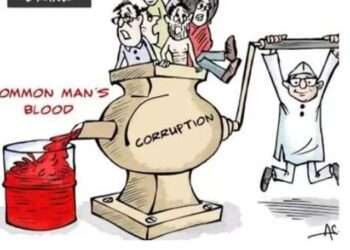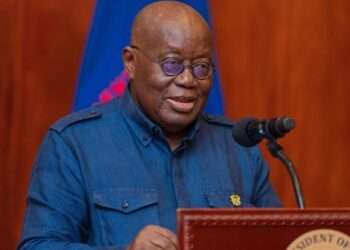A recent Afrobarometer survey has found that general trust in public institutions in Ghana has declined between 2019 and 2022.
However, the Ghana Armed Forces, religious leaders, traditional leaders, and the courts emerged as the most trusted among key public institutions. Sixty-seven (67) percent of the respondents noted that they trusted the Ghana Armed Forces a lot in the recent survey conducted this year.
Meanwhile, the Presidency experienced the biggest decline in trust, by 25 percentage points in 2022 as only 32% of the respondents noted that they trusted the Presidency ‘a lot’ or ‘somehow’.

In the survey conducted in 2019, 58% of respondents indicated that they trusted the Presidency. From the survey, it was observed that trust in the Presidency is on the decline, having dropped from 73% in 2017 to 58% in 2019 and then to 32% in 2022.
Perceived corruption
The survey further revealed that perceptions of corruption among public officials and public institutions have increased compared to 2019. Among key public officials, the police, the Presidency, MPs, judges and magistrates, and tax officials are most widely perceived as corrupt.
The police and the office of the Presidency emerged as the most corrupt institutions in the country. Sixty-five (65) percent of the respondents indicated that all police officers are corrupt as compared to 55% for the office of the Presidency.

Members of Parliament (54%), Judges and magistrates (46%), Tax officials (46%), and the Electoral Commission (45%) followed in that order.
Overall, more than three-fourths (77%) of Ghanaians say the level of corruption in the country increased “somewhat” or “a lot” over the past year, a 24-percentage-point jump compared to 2019. Fewer than one-third (30%) of Ghanaians believe that people can report corruption without fear of retaliation, a decline by 4 percentage points compared to 2019.
Performance of elected leaders
Majorities of Ghanaians rated the performance of the President, their MP, and their Assembly Members as “fairly bad” or “very bad”. Positive ratings of the President’s performance have declined by 31 percentage points between 2019 and 2022, from 61% to 30%.
This means only 30% of Ghanaians believe the President has performed his job well over the past 12 months prior to the survey. The President’s performance, rated 76% in 2017 dropped significantly to 61% in 2019 before falling flat to 30% this year.
Expectations and assessment of the 8th Parliament (‘hung’ Parliament)
Data from the 2021 post-election survey by CDD-Ghana indicated that most Ghanaians expected the current composition of Parliament to significantly impact some parliamentary practices/functions and the government’s business/programs.
However, the Afrobarometer 2022 survey showed that Ghanaians have mixed reviews about the impact of the current composition of Parliament.
About half (46%) think the composition of the 8th Parliament (“hung” Parliament) has made MPs ‘somewhat’ or ‘much more’ effective in scrutinizing government spending. However, fewer think the MPs have been more effective in passing laws (39%) and are more likely to cooperate and build consensus with members of other political parties (39%).
Regarding political party financing, two-thirds (67%) of Ghanaians do not think the government should directly support political parties during election campaigns. Among the few that ‘agree’ or ‘strongly agree’ that the state should support political parties, about one-third (36%) say the government should provide direct financial support to every eligible political party.
A quarter (25%) wants an equal amount of free advertising on state media for every eligible party. Two in 10 (21%) say the government should provide resources like vehicles and office equipment to every eligible party. However, two-thirds (67%) of citizens are unwilling to pay additional tax/levy to fund political parties.
READ ALSO: Corruption Goes Against Democratic Systems- Political Scientist





















